45 Good Habits for Kids (& Simple Ways to Teach Them)
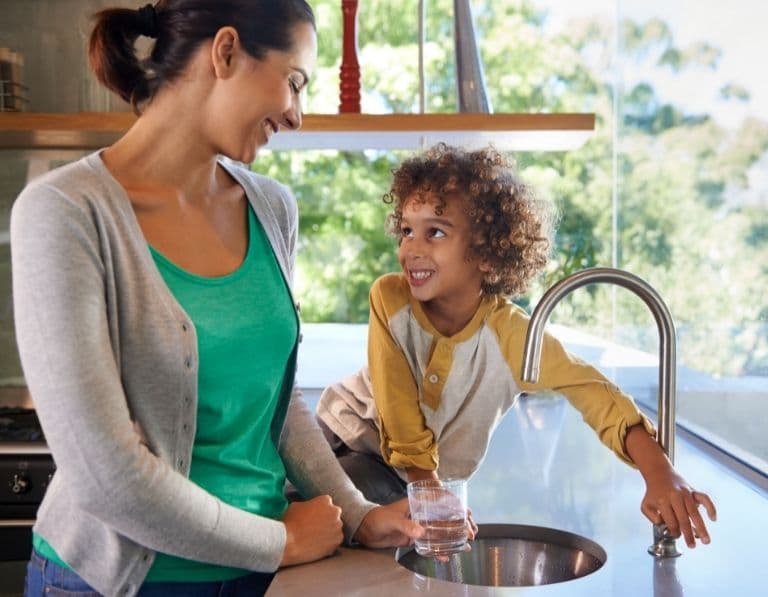
We all want to set our kids up for a happy, healthy life. One that they maneuver with grace through life’s ups and downs.
Plus, teaching kids good habits early, makes it so much easier for them later. (At the very least, they’ll have a clear guide that helps them navigate.)
*Note: Please don’t try to teach the entire list of good kid habits at the same time! Embed some in routines and use others as valuable to-dos during long breaks from school.
This post contains affiliate links at no cost to you. See my disclaimer for more info.

Would you like to save this idea?
Good Habits for Preschool
First, we start with the littles! (If your kids are older, skip ahead!)
Often parents wonder what is helpful for kids going into preschool and kindergarten. In this section, we focus on life skills and habits instead of academic to-dos (numbers, shapes, etc).
1. Get Dressed Independently
Teaching independence is a big part of the preschool age! Helping kids learn to dress themselves and put on their own shoes gives them confidence (and gives parents breathing room too).
2. Put on Jacket
As an extension, many preschools focus specifically on teaching the child to put a coat, gloves, and hat on by themselves. Take it a step further by packing their backpack together before school.
3. Listen
Listening is a life skill that starts early. According to the American College of Education, the best way for you to help your child with listening is by listening to them.
Additionally, they suggest you give short multi-step directions, read them stories on topics they are interested in, and teach whole body listening.
4. Wash Hands
Washing hands well has never been more important!
For a year or two, I put up a paper in my kids’ bathroom reminding them of the steps needed. (My son liked to skip it – we had to become more intentional)
- Wet your hands
- Get soap
- Rub hands together
- Rub hands together under water
- Rinse off all the soap
- Dry hands with a towel
5. Go Potty
Of course, potty training is a right of passage for everyone. Getting your child to go on the potty not only helps them become independent, but also saves you a lot of money on diapers.
6. Fine Motor Skills
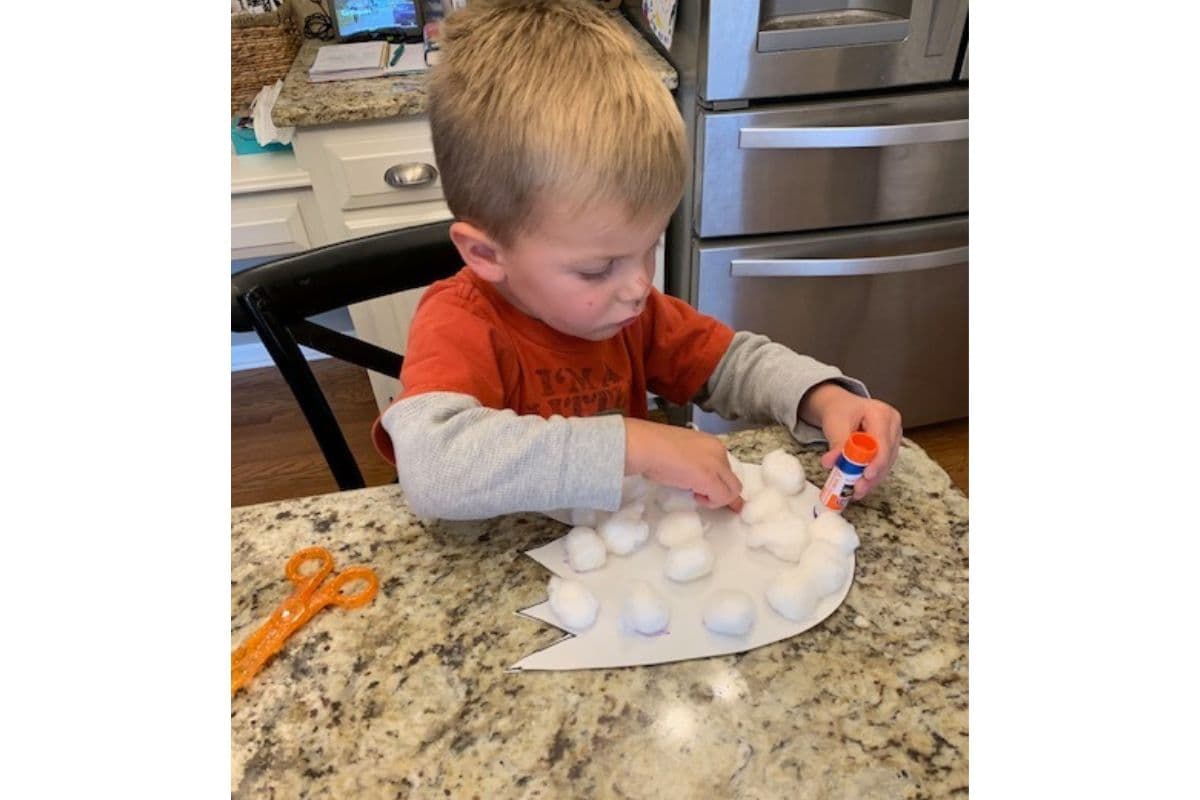
Next, kids need to develop a good foundation for their fine motor skills at this age.
This includes using scissors but also hand-eye coordination and learning a pincer grasp (useful for holding a pencil later). Here’s a great post of fine motor activities for preschool age.
7. Share and Take Turns
Sharing is tough, but if they learn to play cooperatively, negotiate, and cope with disappointment now, they’ll be in MUCH better shape later on. Try setting a timer for taking turns to help take the pressure off of both of you.
8. Imaginative Play
In this day and age, it’s tempting to direct our kids’ play. There are a million activities online that do this. But it’s important for kids to have plenty of unstructured free time so they learn to use their imagination and develop cooperative play skills.
9. Tie Shoes
Finally, for our little ones, tying shoes is a kindergarten skill that helps kids gain independence. It also builds their fine motor skills, dexterity, and hand-eye coordination so it aids in overall development.
***Good Habits for Kids Chart
For young ones, the reward chart in the kids reward pack is a great way to help with those important first-time habits like going potty and tying shoes!
Listen To A Read Aloud Routine Book

Healthy Habits For Kids
Next, these good kids habits help build strong bodies and minds. The truth is, we are surrounded by temptations often. If we can build a solid health foundation in our kids we could be giving them YEARS of better living.
10. Eat Healthy Foods
First, a healthy lifestyle starts (and ends) with food. Sometimes that’s easier said than done when it comes to our kids!
To build healthy food habits include multiple vegetable options at meals. That way, if they don’t want to eat something, they have something else available that’s good for them. Keep meals colorful, limit processed food snacks, and try smoothies or other recipes that make healthy eating fun.
11. Educate Kids About Food
There are a TON of misleading labels on our food. As they get older, show your kids how to look at the nutrition labels and evaluate the true value of their food. Ask questions like…
What’s in this food? Can you pronounce it?
How much sugar is in this? Is that number a lot?
12. Drink Water
Getting into the habit of drinking water instead of soda and juice is a small thing that saves a TON of struggles later on. Just make it a rule that juice is for special occasions and you don’t drink soda.
13. Stay Active
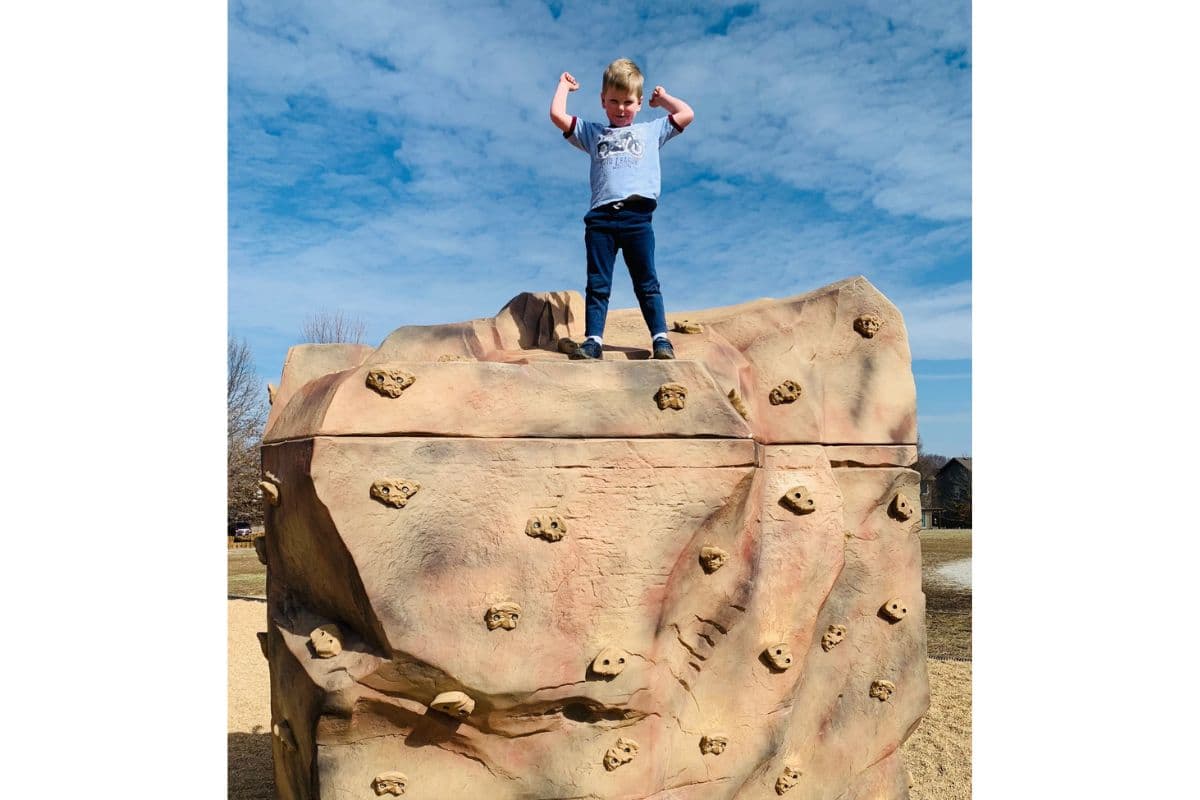
Next, keep kids moving while they’re young, and they’ll be more drawn to movement later on.
There are two great ways to do this:
- Sign them up for physical activities they are interested in.
- Get moving as a family! Take family walks after dinner or weekly bike rides and reap the benefits of fresh air, quality connection time, and being fit together.
14. Be Outside
Spending time outside reduces stress and improves your mood and focus. If kids learn to love the great outdoors early, they’ll also be more respectful and appreciative of the beauty that our world offers.
15. Eat Breakfast
Next, kids need the energy that breakfast provides. So, a healthy first meal gives them a bright daily start and also teaches them to start their days off right.
Try a whole foods approach like…
- Eggs with spinach
- Oatmeal with fruit
- A smoothie
- Fruit and almond butter
16. Pack a Healthy Lunch
Finally, imagine a child that learned to pack a healthy lunch as a kid. What a booster as an adult (both to health and money management)!
To teach this kids habit, have your kids help you make lunches! Have them pick a fruit and vegetable to go with their main item, and do it regularly.
Related Post: Fun Freezer Lunches to Make Ahead
Good Habits for Kids at Home
17. Do Chores

Everyone in your household should contribute to the greater good. It’s important to teach children that you are part of a team that works together. Plus, regular chores teach kids household skills and the value of hard work.
To start chores with your kids, see this free template chore chart or the daily household chores list.
18. Learn to Cook
As an adult, the habit I wish I had learned more of was cooking. 15 years later, my husband is still a better cook than I am, and I’m convinced it’s because he cooked a lot as a kid.
Even teaching your child the basics like making eggs and spaghetti gives them a foundation down the road.
Experienced school psychologist, Dr. Jamie Donnelly, says, “by helping with grocery shopping, kids can learn to make healthy choices. Further, they can help prepare the meals to encourage healthy habits.”
Here are a few great cooking resources for kids:
19. Money Management
Teaching your kids to properly handle money can mean the difference between chasing money their whole lives or being a millionaire. These habits start early and make a profound difference in the long run!
Start with an allowance system and guide them with their decisions on what to save, spend, and give. As they grow, discuss the basics of big expenses, the stock market, and your financial dreams.
20. Pick Up
If you can teach kids to keep things tidy early, you’ve won a long-term battle! Often, this is a regular habit of putting your plate away or picking up toys after playing with them.
These resources can help with young ones:
21. Stay Positive
In the constant news world we live in, it’s easy to get down. But teaching kids to stay positive is teaching them to be resilient.
So, try a “good & grit” game at dinner. Everyone at the table says one good thing that happened to them and one way they worked through a challenge.
22. Honesty
The habit of telling the truth starts young. Make telling the truth a priority in your home and your kids will have honesty and integrity to fall back on for life. (This book is helpful if you need more guidance.)
23. Family Relationships – Togetherness
According to research at the University of Florida, sharing a family meal means that:
- family bonds grow
- kids are happier (less depressed and anxious)
- everyone eats more nutritious meals
- kids do better in school
- kids are less likely to be obese or overweight
- kids are less likely to use/abuse drugs, cigarrettes, or alcohol
That’s a lot of benefits (and just the tip of the iceberg in the research)! So make family meals a regular habit that kids come to expect.
24. Good Hygiene
Establish regular morning and night routines that include brushing teeth, showering, brushing hair, and clipping nails. These are basic habits that can sometimes be overlooked. But emphasizing them now makes it easier later.
For a clear kids routine, try this daily schedule template chart.
25. Pick Up Litter
When your kids see litter on a trail or sidewalk, what do they do? Get them in the habit of picking it up by showing them that you do it too. Also, talk about how important the Earth is to our livelihood, so they understand how we are interconnected.
26. Make Sleep a Priority

Many kids and teens are sleep-deprived (thanks to their devices). Following a clear bedtime routine can help.
Make sure kids get enough exercise during the day so that they are tired. Then, create an electronics “off time” and have an established “lights out” time that kids follow. (Doing this yourself is a great model). Here’s an example:
8:00 No electronics time, read short kids bedtime stories or homework
9:00 Lights out
27. Be Open to All
Raise your kids to be open to all kinds of people. In order to do this, it’s important to expose them to other cultures, races, and backgrounds. Look for sports teams and neighbors who come from different places and think differently.
This is often overlooked, but building curiosity instead of fear or apathy will make a HUGE difference in how they react to people as they become adults.
28. Spend Time With Friends
Friendships and learning to socially interact are some of the most important aspects of healthy development in school-aged children.
In fact, playing with friends teaches valuable skills such as communication, cooperation, and problem-solving. Having friends can also affect their performance in school.
So, set up a few playdates or activities (it doesn’t need to be a crazy amount) and let kids have regular free time with siblings too.
29. Be Kind
Kindness towards others (and animals) gives kids a sense of belonging and self-esteem. Acts of kindness also increase energy, gratitude, and optimism.
So, make kind words and actions a priority in your home through kindness activities and games for kids, family giving (like this 12 days of Xmas gift), and helping those in need.
Discussing this phrase can help kids test their thoughts too:
Is it true?
Is it necessary?
Is it kind?
Related:
30. Patience
In today’s instant gratification world, teaching your kids patience gives them a massive advantage for life. So, explain how patience pays off, and that it’s worth it to try to relax and be calm as you wait.
Encourage activities such as gardening, saving money, and cooking where you have to wait for the results you want. And check out these fun kids breathing exercises for help with patience, anger management, and stress relief.
31. Gratitude
Research proves that gratitude is strongly associated with greater happiness. This is because it helps you be more positive, savor good experiences, deal with adversity, and improve your health and relationships (source).
Cultivate the habit through praying twice a day or writing down the good things in your life morning and night. Do this with your kids and discuss what you’ve each come up with.
Related: Great Kids Gratitude Activity Ideas
32. Be Helpful
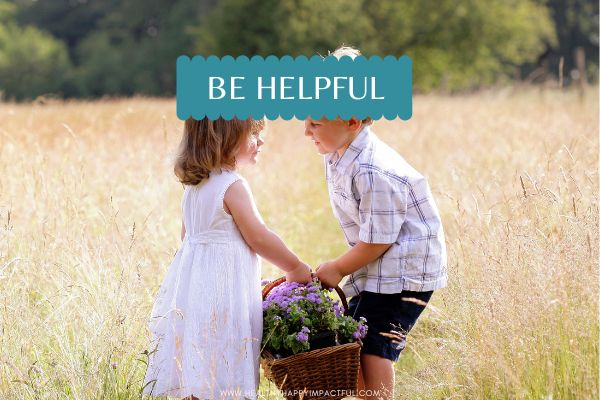
Encourage kids to provide a helping hand to those in need. And show them the way; help people, be it a friend or a stranger, in front of your kids. Also, explain why you are doing it. (While also cautioning them to be careful with strangers.)
33. Build a Growth Mindest
Having a growth mindset means that everything in life happens for your growth. Failures are just a stepping stone to get to where you want to go.
So, celebrate when your kids try new things, when they have an “oops” moment, or when they took on a challenge. For more,
34. Take Responsibility
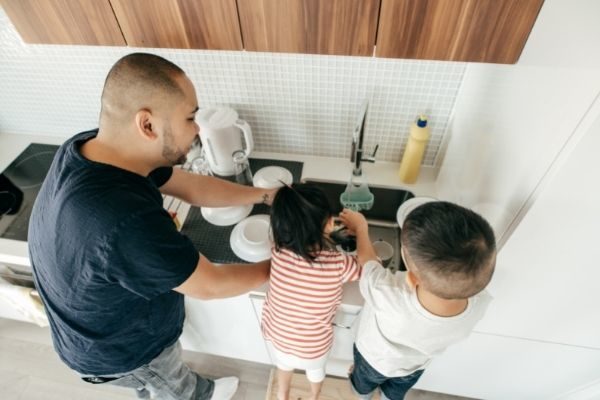
“Wasn’t me” lives at my house.
There’s also been a lot of trouble blamed on our imaginary dog. As a result, we’re working on the habit of taking responsibility at my home.
For this, model taking responsibility for your life as an adult. And discuss with kids why leaders take responsibility. You can’t improve your situation if you don’t first take responsibility for it.
35. Screens Aren’t Everything
Our kids are growing up in a digital world. They see screens at all hours of the day (through more devices than we ever imagined).
But time on screens means less time outdoors, getting exercise, and learning social interaction. In many cases, it also means less sleep, more exposure to detrimental social media, and more behavioral problems (source).
So, set clear boundaries for screen time and stick to them.
The American Academy of Pediatrics (AAP) can help you create your own family media use plan.
Watch the Video for My Favorites!
Then, don’t miss the top student habits below!
Good Habits for Kids at School

Next these good habits for students help kids build lifelong learning into their daily routine schedule. How awesome is that?!
36. Read Daily
Reading helps build focus, empathy, and imagination. Children who read also do better in school and have a deeper understanding of the world.
Moreover, if you read together it builds deeper relationships between parents and kids.
So, make reading a treat, and not a chore! Get kids books that interest them so they see it this way!
*Find 10 year olds book series here or good books for 7 year olds to get your child started!
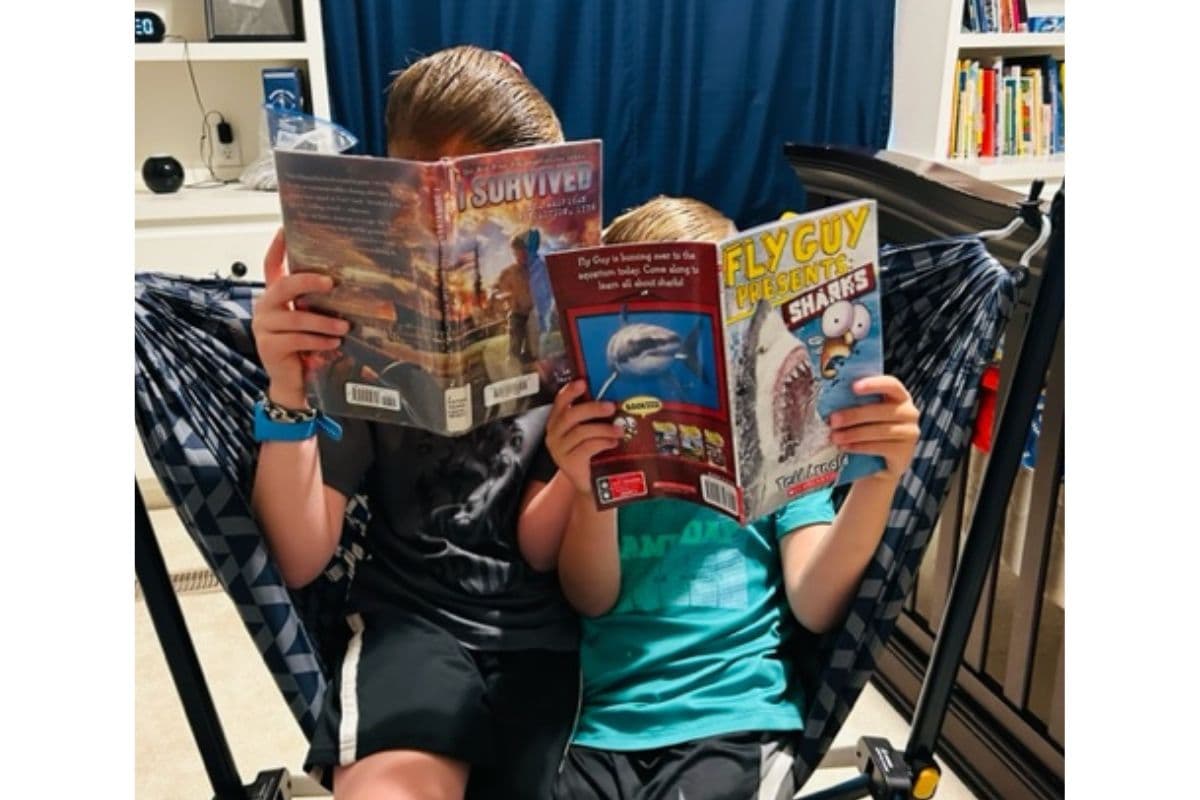
37. Study Skills
Knowing how to study for deep understanding isn’t always clear. Encouraging kids to study regularly and take effective notes is a small thing that reaps big rewards to their learning over time.
38. Be Punctual
Kids that learn to value time will be less likely to waste it. So make it a priority to be on time together and that they complete things on time.
39. Work Hard
As with adults, it’s natural for kids to want to do the least amount of work. But getting into the habit of doing it right the first time and going the extra mile will serve them exponentially as an adult.
Sometimes, that means making them re-do an assignment or running an extra lap.
40. Look Over Your Work
Instead of rushing through, remind kids to stop and check answers before turning work in. It takes only thirty seconds, but it’s a small habit that saves a lot of pain when it’s it comes to grades.
41. Minimize Distractions
Finally, for good student habits, this one is HUGE. Digital distractions are so prevalent that it’s difficult for kids to focus deeply. Teach kids the habit of turning their phone off during study time and minimizing time spent on social media and youtube until their work is done.
Make Expectations Clear
Grab access to a free checklist to help you navigate these habits daily!
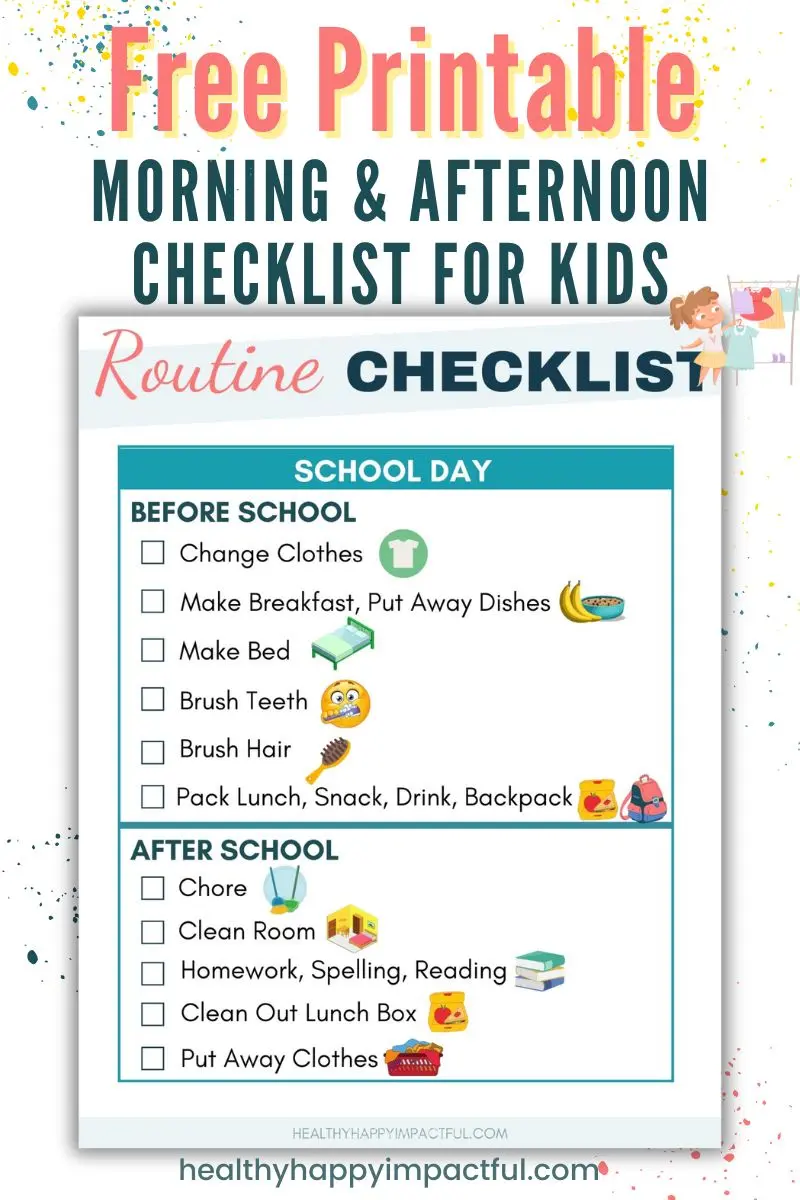
Or check out the Full Gold Star Routine Pack – it has everything you need to wipe out routine battles – or it’s free!
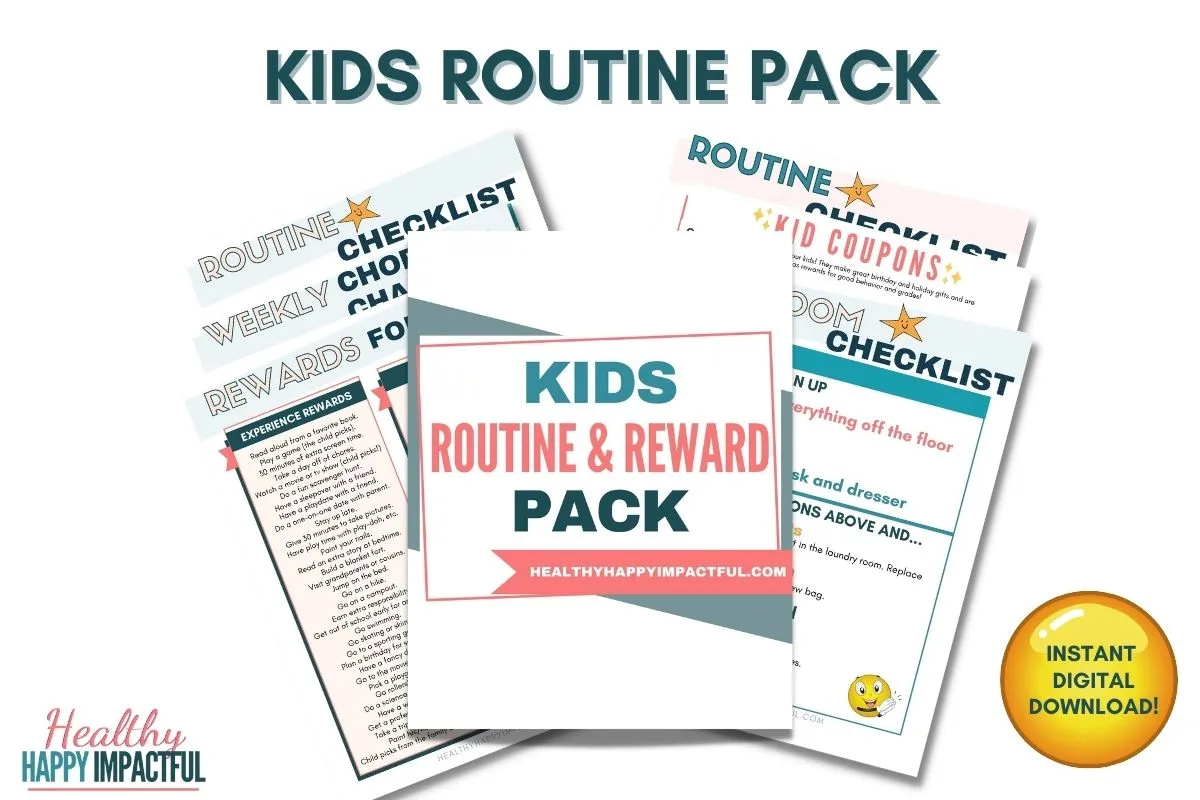
Good Manners For Kids
42. Please, Thank You, & Sorry
Good manners teach kids the value of respect and kindness. It’s not hard to use manners, but it is a habit that has to be focused on regularly (and modeled) for it to stick.
43. Noticing & Appreciating Everyone
If you can teach your kids to look others in the eye and actively listen to them (so the other person feels seen and appreciated), you’ll be setting them up for great success later on.
44. Table Manners
Eating with the proper utensils, using manners, and offering food to others all seem to be a lost art in today’s world. Bring back a little etiquette to the dinner table and you’ll be helping kids navigate social settings later on.
45. Sportsmanship
Losing is hard. But we can teach kids that it’s not always about winning or losing. The progress you achieve, the amount you learn, and the effort you put in are important too.
How to Develop Good Habits With Kids
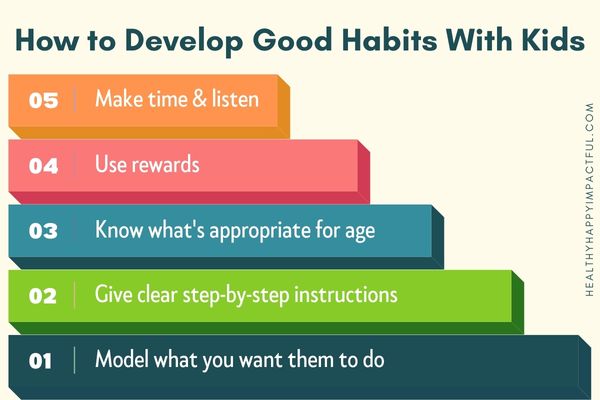
Now, we have a great list of good habits for kids. But how do we teach them so that they stick? Here are a few key tricks:
Model What You Want Them To Do
Above all, show your kids what good habits look like. Work on them yourself! (Use this adults good habits list and printable habit tracker)
Perhaps they won’t follow in your footsteps immediately, but they’ll remember the way you acted much more than what you said. THIS is what they’ll think of years down the road. For example…
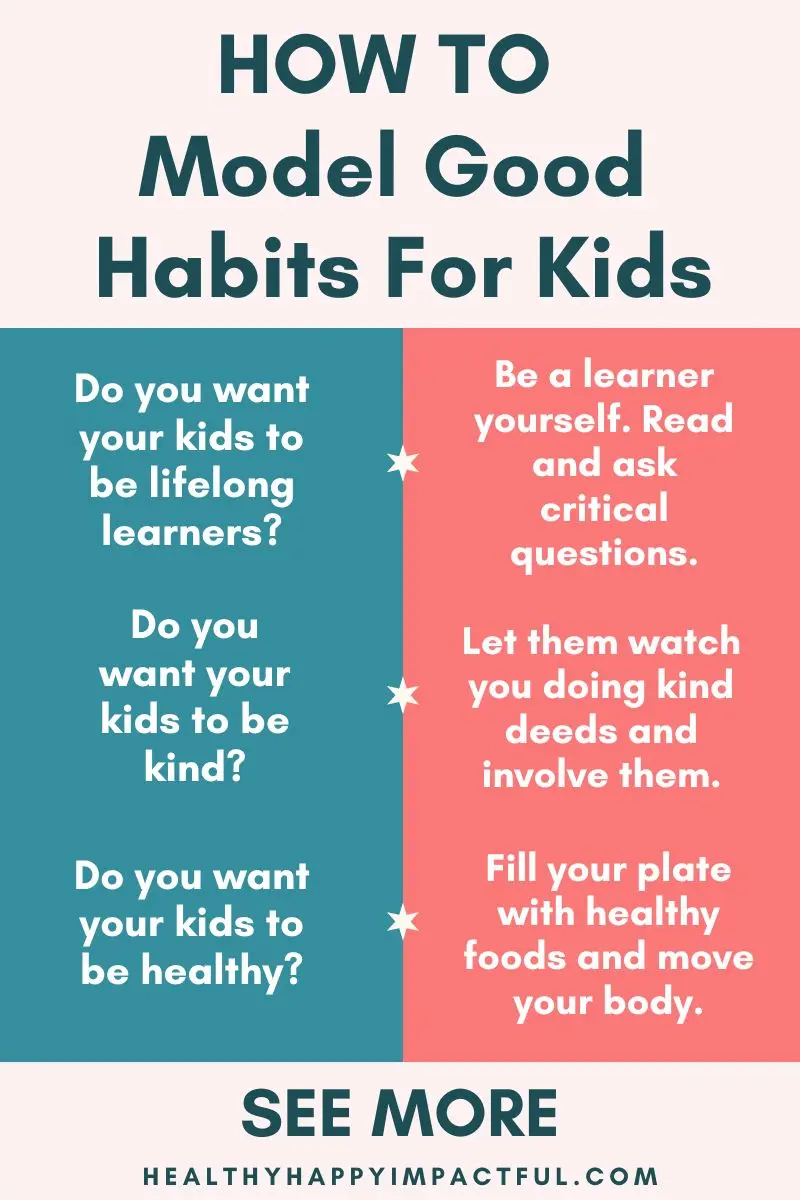
Give Step-By-Step Instructions
Kids need guidance and clear steps. So, for more complicated habits don’t be afraid to break them down.
I mentioned that I put an instructions sheet up for washing hands in my kid’s bathroom, but you can also give checklists for bathroom cleaning, cheat sheets for studying, and clear recipes for cooking.
Know What’s Appropriate For Age
If something isn’t working it may be because your kids aren’t ready for it. Just as some chores are too old for kids, so are some habits. Remember that they don’t have to learn everything all at once, and some of them get easier with time.
Use Rewards
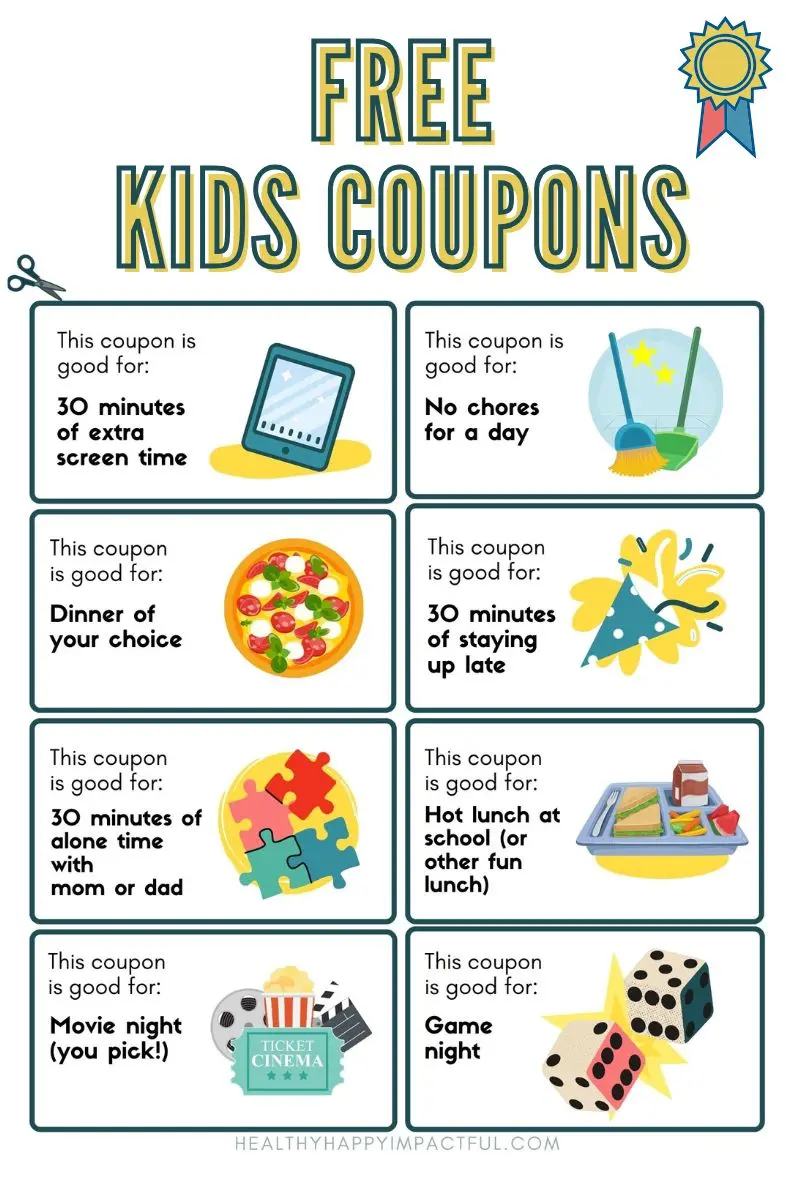
When kids need extra motivation, we love using these free printable reward coupons. The coupons support the good kids habits in this post!
Also, see the list of easy kids rewards for tons that kids love.
Make Time for Family
It’s impossible to teach and model lasting habits if you aren’t around your kids often. So, schedule in family time at the beginning of your week, both for good kids habits and for fun together.
Try this Family Feud together or inspirational family movies to make it easy.
Stay Involved – Listen!
Keeping bad habits out as kids get older isn’t always an easy task. It’s important to build a strong connection with your kids to keep the lines of communication open. Talk to them about the sneaky power of peer pressure and make sure they know they can talk to you.
What’s Next?
What do you think are the best habits for kids? And what has worked for teaching them in your home? Leave a comment and let me know!
Next, enter your email below to grab access to our resource library for free printables and resources.




Great and resourceful thank you for sharing
I’m so glad you enjoyed the kids habits Fredah!